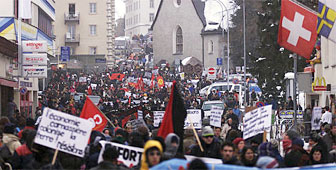“Other Davos” calls for alternative debate on world order

As the rich and powerful gather in Davos for the World Economic Forum, an alternative conference is getting underway in Zurich.
The “Other Davos”, as it is called, will bring together academics, left-wing groups and other interested parties from all over the world to a series of debates and workshops at the Volkshaus in Zurich.
One of the organisers of the alternative event is Charles André Udry, a Swiss economist. “It’s important to have an alternative Davos in order to encourage independent thinking,” says Udry. “We need to escape from the one way of thinking which seems to dominate today.”
Udry’s colleague Barbara Rimml from Bern agrees. “It’s not enough just to complain about globalisation. What we need to do is look more deeply at the causes of globalisation, and the problems that arise; that is why we are having this conference.”
Perhaps surprisingly, neither Udry nor Rimml oppose globalisation. “Certainly not,” says Udry. “There is no point in opposing an economic process which has actually been going on for years.
“What we oppose is the current form of globalisation which concentrates wealth and power in the hands of a few, and leaves much of the world impoverished.”
The organisers of the “Other Davos” expect up to 1,000 people to attend their conference. There will be workshops on all aspects of globalisation, including its effect on the environment, on women, and on the migration of populations.
“It’s vital that we think more deeply about these issues,” says Udry. “We don’t need to accept the mantra that everyone – workers, women, peasants, needs to adapt to the so-called new economic order.
“As an economist I can tell you that this is simply not true. Traditionally economics is supposed to be a mixture of political, economic and social choice.”
In addition, the “Other Davos” will hold two special debates devoted to Columbia and Palestine. “These are two regions where there has been civil conflict for almost half a century,” says Barbara Rimml. “And the intervention of the world powers has not prevented it.
“In fact, in the case of Columbia the involvement of the United States has probably made thing worse for many Columbian farmers. And since the president of Columbia is invited to the World Economic Forum in Davos, I think it’s appropriate that we discuss what’s going on there too.”
At the close of the “Other Davos” conference many of those attending will move on to Davos itself, where they plan to protest against the World Economic Forum, despite a ban on demonstrations by the authorities in Davos.
“I think it is my democratic right to express my opinion about the current world order,” says Rimml. “It’s simply too easy for the authorities in Davos just to ban our demonstration. If all those world leaders can go to Davos and say what they think, then I have the right to do the same.”
Nevertheless, Udry is aware that the attention being devoted to the demonstration, and to the possibility of violence, could well detract attention from the issues being discussed at the “Other Davos”.
“It’s in the hands of the media,” says Udry. “It is also their democratic right to decide what they want to focus on.
“But if they choose to give a lot of coverage to a minority of demonstrators who might cause problems, instead of paying attention to some serious discussions about different ways of thinking, and alternative ways of allocating the world’s wealth, then I think that would be a great shame.”

In compliance with the JTI standards
More: SWI swissinfo.ch certified by the Journalism Trust Initiative









You can find an overview of ongoing debates with our journalists here . Please join us!
If you want to start a conversation about a topic raised in this article or want to report factual errors, email us at english@swissinfo.ch.